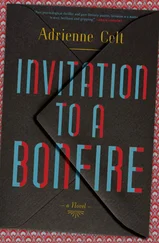The only justification I could fathom for the casting was that I was young and knew how to hold back my sass onstage when the moment demanded it. They didn’t want a mezzo-soprano, they wanted someone really innocent, and after spending twenty years under Ada’s watchful eye, I suppose I appeared to qualify. She hadn’t been careful with Sara, because Sara’s voice is low and easy, waves against a boat and wine dripping down the neck of a bottle. But my voice is limoncello, steam from a kettle, flint. It can be dangerous if you turn your back on it, and Ada knew better than to make that mistake again.
The first day of rehearsal was a disaster. Or at least it started out that way. I’d been working over the role phrase by phrase, picking it apart with Baba Ada in our living room, while outside the snow melted and then froze back up in rigid bulges. We could have worked in my mother’s empty room — had, in fact, intended to turn it into a studio. But that didn’t pan out. Her absence shuddered through it, always. When I crossed the threshold I couldn’t sustain notes and started breaking out in nervous sweats. My throat closed up, growing thicker and thicker from the inside, and I swallowed with great glottal gulps until Ada couldn’t take it anymore and swatted my bottom. I felt smoke rising behind my eyes. So we moved back into the living room.
I stood onstage at the Lyric beside the piano and drummed it with the pads of my fingers. The pianist gave me a dirty look — I was nowhere near the tempo of the section we were rehearsing. Pelléas et Mélisande has no real arias, but there are two brief solos and one of them belongs to Mélisande. A foundling from the woods, she marries a prince and falls in love with his brother but is too stupid to understand quite what she’s done. Her song from the tower is all about her long and long-suffering hair — shades of Rapunzel — very waiflike and full of dull quavering. That was what we were starting our day with. I tapped out the rhythm but sped it up to triple the appropriate pace. In my rehearsals with Ada, I’d sprinted through the song to keep myself motivated, and it left us both rolling on the floor with tears in our eyes. My long hair awaits you in the tower —it sounds much better frantic, as maniacal as its meaning.
“Ehm, I think we should get started,” said Rick. These days, I’ve come to love Rick. I love that his name sounds like it should belong to a bricklayer instead of an accompanist. And that he can hold a casual conversation while playing Tchaikovsky’s first concerto. But that morning I did not love him yet.
“I am started,” I snapped at him. “All warmed up and nowhere to go.”
“Whatever.” Rick yawned. He’s used to dealing with divas, actual divas. I barely weighed enough to legally give blood.
“All right,” said the director, Martin. He was parked in the fifth row — not the house’s best seats but close enough to be audible when he wanted to start dissecting our work. Beside him sat Philippe, who was overseeing the whole season, and looked crassly intimidating in a black mock turtleneck and blazer. It was unusual for Philippe to attend a first run-through, and I pushed away the feeling that perhaps his presence had to do with me. The feeling that this was perhaps a test.
“From the beginning. We’ll run through the tower song a few times at least so we can”—he waved a hand above his head—“get calibrated, really make sure Mélisande feels right. She’s the key to setting the tone here. Remember”—Martin swiveled to face me directly—“in her head, she’s still lost in the woods, even though technically speaking she’s up in the castle. And she’s about to get a lot more lost, though she doesn’t know it yet.”
He leaned over and whispered something to Philippe and then settled back in his seat, hitching one ankle over his knee.
“Okay, Mellie, let’s take her for a ride,” said Rick. I glared at him but said nothing, just curled my fingernails up into my palm so I wouldn’t be tempted to tap them on the piano shell. I rested my other hand briefly on my stomach, checking my own posture since there was no ruler here to keep me in place. Then I breathed, and sang.
Mes longs cheveux descendent jusqu’au seuil de la tour;
Mes cheveux vous attendent tout le long de la tour,
Et tout le long du jour,
Et tout le long du jour.
I had just about reached Mélisande’s list of saints when Philippe tilted over and started whispering to Martin. I stared at them without breaking my pace, then glanced back at Rick, who shrugged. It’s not a long piece, and we were through it before I had time to really worry. Without looking up, Martin flicked a hand at us.
“Again.”
And so we started from the beginning. Mes longs cheveux descendent , and all the rest. The two men had their heads pressed together as if they were teenage boys planning a conquest. They flipped through something, and then Martin looked up briefly.
“Again,” he said.
So we did it again. And again. And again. Repetition, obviously, is par for the course in a rehearsal, especially an early one, but you usually get some sort of direction to stop you from tearing off into the same mistakes over and over. By the fifth go-round, I was tapping my foot against the stage as quietly as I could, swaying my hips just a little to see if a hint of the sultry would get some kind of response. Très innocent , they’d said. Très jeune .
On the sixth repetition, Martin and Philippe were still deep in congress, and my heart was beating hard. Well , I thought, give them something worth whispering about. I caught Rick’s eye just before he went into the opening and released a quick thrum of nails on the piano, then two more, double time. He winked at me.
At first I’m not sure either of the men in the audience noticed our slight edits to the score, but by the tenth bar I’d substituted out Mélisande’s quiet liquid rippling for a tremulous jazz, and by the time we turned the corner into our seventh repetition, Rick and I were racing each other to see who could control the tempo. I had unsettled him by taking the whole piece up an octave, and he retaliated by trilling shamelessly at the end of a phrase.
“Enough!”
The voice startled us so thoroughly that we cut off where we were, Rick letting two or three last notes trickle out before he took his hands away from the keyboard and folded them in his lap. It wasn’t Martin who had spoken, but Philippe, and now that he had our attention he turned back away from the stage.
“Do you see?” he said, addressing himself to Martin but talking loudly enough that we could all hear him. “This is what I was talking about.”
Martin frowned. “She’s too young?” There was a question in his voice. His hand strayed up to his throat, as if it could discern with subtle fingertips the nodes young singers develop on their vocal cords by pushing too hard, straining too soon. I wanted to scream at them. Not me. I’m different.
But Philippe spoke for me.
“She’s wasted on Debussy. This girl is a born Reine de la Nuit .”
A gong went off inside my head, and in its aftermath I couldn’t hear Martin’s reply, could only track the movement of his hands as if they were showing me the way somewhere. Mozart’s Queen of the Night, in The Magic Flute , is his best witch, and I prefer to sing the songs of witches. The Queen is impossible for most voices, and quite wicked. She’s ready to eat her own young.
“Darling.” Philippe leaned forward in his chair, chin seated on his laced fingers like a soft-boiled egg. He was known to devastate debut singers. Make them cry. He purred at me. “Do you think it would be too much?”
Читать дальше












